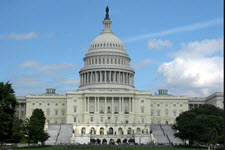The Senate is expected to vote early next week on bipartisan Dodd-Frank reform legislation (S. 2155) that includes a Roundtable-supported measure to reform the Basel III High Volatility Commercial Real Estate (HVCRE) Rule, which would clarify specific requirements for acquisition, development, or construction (ADC) loans.
 |
The Senate is expected to vote early next week on bipartisan Dodd-Frank reform legislation ( S. 2155 ) that includes a Roundtable-supported measure to reform the Basel III High Volatility Commercial Real Estate (HVCRE) Rule, which would clarify specific requirements for acquisition, development, or construction (ADC) loans. |
The Economic Growth, Regulatory Relief, and Consumer Protection Act(S. 2155) represents the most significant change to financial regulatory law since 2010, when the Dodd-Frank Act was enacted. Among the financial issues it addresses, the Act would raise the amount at which banks are considered “too big to fail” – from the current $50 billion threshold to $250 billion – and provides additional relief for community banks and credit unions.
Amendments added this week to the Manager’s Amendment for S. 2155 include a bipartisan HVCRE measure that originated in the U.S. House of Representatives as the Clarifying Commercial Real Estate LoansHVCRE bill (H.R. 2148), introduced by House Financial Services Committee members Rep. Robert Pittenger (R-NC) and Rep. David Scott (D-GA). After passing the House by voice vote in November of last year (Roundtable Weekly, Nov. 10), the Senate Banking Committee took up an identical bill in February – S. 2405 – co-sponsored by Senators Tom Cotton (R-AR) and Doug Jones (D-AL).
Last Friday, the Roundtable and twelve other real estate organizations sent a comment letter urging all members of the Senate Banking Committee to take the necessary steps to enact S. 2405 by including the measure in the broader Dodd-Frank reform package (S. 2155).
The current HVCRE Rule is overly broad and includes many stabilized loans without construction risk in this HVCRE category, unduly burdening those loans with capital charges meant to protect banks from heightened construction risks. As a result, banks, including small community financial institutions, have been deterred from making this type of loan, which can represent up to 50 percent of a small bank loan portfolio.
 |
The Roundtable and twelve other real estate organizations sent a comment letter urging all members of the Senate Banking Committee to take the necessary steps to enact S. 2405 by including the measure in the broader Dodd-Frank reform package (S. 2155). |
The Senate’s HVCRE measure would clarify which types of loans should be classified as HVCRE loans to ensure they do not impede credit capacity or economic activity, while still promoting economically responsible commercial real estate lending. (Roundtable Weekly, Jan. 12).
Senate Banking Committee Chairman Mike Crapo (R-ID) and House Financial Services Committee Chairman Jeb Hensarling (R-TX) continue to work with their colleagues to advance bipartisan reform measure that will muster enough votes for passage in both chambers.
It remains uncertain whether Crapo’s efforts will attract the support of House Republicans, who must approve the bill before it can be sent to the President for his signature. Hensarling said yesterday that the updated Senate bill doesn’t go far enough and needs more provisions to reflect “the will of the House.” (BNA, March 9)
HVCRE reform is a is a top policy priority of The Real Estate Roundtable and its industry coalition partners, who have submitted numerous letters to policymakers since the measure was enacted in 2015. The Roundtable’s HVCRE Working Group played a critical role in drafting the measure and aiding efforts to advance legislative reforms. (Roundtable letter, March 2)
Financial regulation and its effect on commercial real estate lending will be a focus of The Roundtable’s April 25 Spring Meeting in Washington, DC.